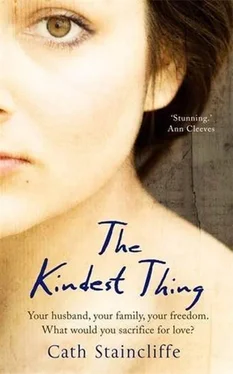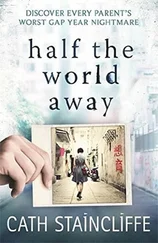‘It could be… the weakness, losing control…’
I stared at him, the cup he’d smashed, the plates he’d dropped now sinister.
‘… it might be motor neurone disease.’
Stephen Hawking on The Simpsons, wheelchair, robotic voice, head lolling to one side.
‘Oh, Neil.’ I wrapped my arm around his shoulders. ‘It’ll be all right,’ I said. ‘Whatever it takes.’
‘There isn’t any cure.’
My heart stopped. ‘But the treatment, there must be something.’ I refrained from mentioning Stephen Hawking – he’d lasted years. Or had he got a different illness?
‘Not really,’ he said quietly.
I kept still. My mind was scrambling, trying to unpick what he was saying.
‘It just has to run its course.’
A deluge of fear, my heart thudding in my chest. This wasn’t happening. No. It wasn’t true. It was a mix-up, that was all, a silly misunderstanding.
‘Oh, Neil. These tests,’ I said tentatively, ‘it might be something else.’ A condition they could treat, a disease they could cure.
‘Yes.’ He took a shaky breath and then another. He was crying. I’d only ever seen Neil cry three times in our years together: at the birth of our children and when I’d told him about my affair. The sound of him crying was alien to me, the rhythm unfamiliar. I climbed on to his lap, wrapped my arms tight around him, raised one hand to cradle the back of his head. He put his face in the crook of my neck. His tears soaked warm into my T-shirt. He was going to die. How long? I was screaming inside. How long? Ten years? Five?
People talk of a bolt from the blue, of being thunderstruck, and that was how it felt. As though Zeus had hurled his lightning bolts at us, a sickening crack to the skull, a galvanic shock, paralysis and the sun stopped in the sky.
‘It might be fine,’ I said.
And the lie, the false hope, lay leaden between us.
At the first opportunity I had, when everyone else was out, I went online to find out about the disease. Doctors did not know what caused some people to develop it. It was not a virus and there was only a hereditary link in a very small minority of cases. Each site I logged on to reported the same stark facts: for those people with the most common form of the disease, life expectancy was between two and five years from diagnosis. Neil’s muscles would weaken and waste – he would lose ability in his arms and legs first; then chewing, swallowing and speaking would become difficult. As his chest muscles also weakened he would only be able to sip shallow breaths. Eventually his breath would fail.
On the upside, he was not likely to become incontinent or impotent. He could go down fucking, then. He wouldn’t go senile either. Although the disease affected the motor nerves that connected the brain to the muscles, the brain itself wouldn’t be affected. He’d be fully aware until the end stage. MND is not a painful killer, not like the cancer that riddled my mother and rendered her insensate with pain. MND sounded sly and swift and wilfully random.
As with any new project, I flung myself into research hoping understanding might make me better able to deal with the situation. I read and read, surfing link after link, waiting for obscure medical abstracts to load as pdf files, sussing out books on the disease, startlingly few. But all it did was reinforce my anger, my alarm, each new web page breaking over me, a cascade of rapids, cold and treacherous. Without hope.
Neil’s next appointment was with a hospital neurologist. Apparently it isn’t easy to diagnose MND in the early stages: the symptoms may be due to other problems, which have to be ruled out. After an examination, a muscle biopsy and an electromyography test to measure muscle strength they might be left with MND. A matter of elimination.
We agreed not to say anything to Adam and Sophie until we knew one way or the other. We were worried about Adam’s reaction. Sophie would be devastated but Adam’s state of mind was fragile and a shock like that could see him in meltdown again.
As it was he beat us to it.
That Friday night, a few days before Neil had to go for tests, Adam didn’t come home. He was sixteen then and had just started back at school. Part of the deal he’d made with us and the counsellor was that he’d be home by midnight or get in touch if not.
That night we lay in bed longing to sleep, taking turns checking the clock. I tried Adam’s mobile at twelve fifteen, one thirty and two forty-five. I got up at five. The house was chilly. There’s a convector heater in my workshop. I went to get it, half hoping that Adam would be there, spreadeagled on the rug or even huddled on the bench in the garden. A lost key, reluctance to disturb us, the explanation.
There was no Adam. Back in the kitchen, I made coffee with hot milk, then dragged out my bread-maker, dusted it down and sprinkled in dried yeast, filled it with wholemeal flour, adding sunflower seeds, chopped dried apricots and walnut pieces, salt, sugar, olive oil and water.
Neil came down at seven. ‘Adam back?’
I shook my head.
‘Should we try Jonty?’ He was one of the friends who still hung out with Adam.
‘It’s very early, I’ll try at nine.’
Neil stood behind me, wrapped his arms around me and stooped to kiss my cheek. ‘He probably got pissed and stayed at someone’s house.’ He straightened up.
‘And lost his phone?’ I was more sceptical. And also, if I thought the worst, as I had done all night – the body broken beneath car wheels; the figure, beautiful and bare-chested, falling as he tried to fly; the knife fight after some silly comment; the beating dished out by a gang of hard lads who had sniffed out Adam’s middle-class softness – it would not come to pass.
The phone rang. It was Manchester Royal Infirmary. Adam had been admitted to A &E. Unconscious. He’d ingested a cocktail of drugs washed down with vodka. They were pumping his stomach.
When we got there he was awake but very drowsy, looking sheepish and then plain sad when I asked him if he was okay.
‘I’m sorry,’ he said to us both. There was defeat in his tone, a note that sent a chill through me, as though he’d accepted that it would always be like this. Him messing up, him hurting us, scaring us.
He claimed not to remember anything about the hours before he collapsed.
‘Nothing?’ Neil said incredulously. ‘Not where you were, who you were with?’
Adam shook his head and looked away, his lips parted slightly, his tongue up behind his front teeth: a trick he uses to fight tears. Had he taken the drugs to get off his head or had he wanted to harm himself? The question bored into my brain. It didn’t seem fair to ask him yet and I guessed he’d be more likely to lie now, in the immediate aftermath, eager to reassure us and be forgiven. I knew all that but I was so upset I wanted to shake him.
‘You promised,’ I heard myself saying, ‘that if you ever felt at risk…’
‘Mum, I got trolleyed,’ he said. ‘That’s all, honest. I’m sorry.’
The rest of the weekend I found myself watching Adam, looking for signs of deterioration: was he hanging around the kitchen so he wasn’t alone? Was he feeling anxious again? When he stayed at home all day Sunday, was that because he wanted to chill out after Friday’s scare or because he was too fearful to leave the house? I asked him if he wanted to see the GP but he shrugged a no. He gave the same response when I offered to contact the counsellor.
Once Sophie knew he was okay, she dealt with the situation by ignoring it: he wasn’t going to get any of her attention with his dumb behaviour. She had spent her life being frustrated by Adam, playing together and invariably falling out. Adam always pushed things too far, rebelled; he’d grow bored with whatever game they were playing and want to change the rules; he’d get distracted and start playing something else. Sophie would end up incandescent, in angry tears, vowing never to play with him again. Till next time.
Читать дальше












